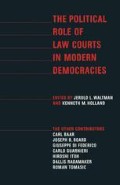Abstract
Any analysis of the judicial institutions of the United Kingdom must begin by differentiating England and Wales from Scotland and Northern Ireland. The latter two have their own systems of courts, and while joined at the apex, they do not overlap with the English-Welsh system, which for convenience we will henceforth simply call English.1
Access this chapter
Tax calculation will be finalised at checkout
Purchases are for personal use only
Preview
Unable to display preview. Download preview PDF.
Notes
Sir Leslie Scarman, English Law: The New Dimension (London: Stevens, 1974), p. 68.
An excellent general discussion can be found in S. A. de Smith and J. M. Evans, Judicial Review of Administrative Action, 4th edn (London: Stevens, 1980).
See, inter alia, Philip Norton, The Constitution in Flux (Oxford: Martin Robertson, 1982)
Nevil Johnson, In Search of the Constitution (New York: Pergamon Press, 1977)
and Anthony H. Birch, ‘Britain’s Impending Constitutional Dilemmas’, Parliamentary Affairs, XXXVII (Winter, 1984), pp. 97–101
See Lief Carter, Reason in Law, 2nd edn (Boston, Mass.: Little, Brown, 1984), pp. 152–7.
Roscoe Pound, The Spirit of the Common Law (Boston, Mass.: Beacon Press, 1966; originally published 1921), .p. 1.
See John Austin, Lectures on Jurisprudence, 3 vols (New York: Burt Franklin, 1970; originally published, 1861).
A complete discussion of court structure can be found in R. M. Jackson, The Machinery of Justice in England, 7th edn (Cambridge: Cambridge University Press, 1977).
A good overview of the history of magistrates courts is Elizabeth Burney, J.P.: Magistrate, Court and Community (London: Hutchinson, 1979), ch.3.
The Lord Chancellor’s role is discussed in the following: Allan Paterson, The Law Lords (London: Macmillan, 1982)
Robert Stevens, Law and Politics: The House of Lords as a Judicial Body, 1800–1976 (Chapel Hill: University of North Carolina Press, 1978)
Louis Blom-Cooper and Gavin Drewry, Final Appeal: A Study of the House of Lords in its Judicial Capacity (Oxford: Clarendon Press, 1972)
and R. F. V. Heuston, Lives of the Lord Chancellors, 1885–1940 (Oxford: Oxford University Press, 1964).
Pat Carlen, Magistrates Courts (London: Martin Robertson, 1976) and
Roger Hood, Sentencing in Magistrates’ Courts (London: Stevens and Son, 1962) should also be consulted.
John A. G. Griffith, The Politics of the Judiciary (London: Fontana, 1977), p. 18.
Harry Street and Rodney Brazier, de Smith’s Constitutional and Administrative Law, 4th edn (London: Penguin, 1981), p. 377.
Philip Norton, The British Polity (New York: Longman, 1984), p. 314.
On the legal profession see Michael Zander, Lawyers and the Public Interest: A Study in Restrictive Practices (London: Weidenfeld and Nicolson, 1968) and
Brian Abel-Smith and Robert Stevens, Lawyers and Courts: A Sociological Study of the English Legal System, 1750–1965 (Cambridge: Harvard University Press, 1967).
Anthony Sampson, The Changing Anatomy of Britain (New York: Random House, 1982), pp. 152–3.
C. Neal Tate, ‘Paths to the Bench in Britain: A Quasi-Experimental Study of the Recruitment of a Judicial Elite’, Western Political Quarterly, XXVIII (March, 1975), pp. 108–29.
For a compilation of such extra-judicial activity, see David Butler and Anne Sloman, British Political Facts, 1900–79 (London: Macmillan, 1980), pp. 274–7.
On natural justice, consult Paul Jackson, Natural Justice, 2nd edn (London: Sweet and Maxwell, 1979).
The first polemic was Lord Hewart, The New Despotism (London: Ernest Benn, 1929).
See Peter Robson and Paul Watchman, Justice, Lord Denning and the Constitution (London: Gower, 1981).
See Colin Campbell (ed.), Do We Need A Bill of Rights? (London: Temple Smith, 1980) and
Michael Zander, A Bill of Rights? 2nd edn (Chichester: Barry Rose, 1979)
See Vernon Bogdanor, Devolution (Oxford: Oxford University Press, 1979).
See Richard Johnston, The Impact of Judicial Review on Federal-State Relations in Canada, Australia, and the United States (Baton Rouge: Louisiana State University Press, 1969).
Samuel H. Beer, Britain Against Itself (New York: Norton, 1982).
See S. E. Finer (ed.), Adversary Politics and Electoral Reform (London: Wigram, 1975).
See Philip Norton, Dissension in the House of Commons, 1974–79 (Oxford: Oxford University Press, 1980).
See, for example, Patrick Devlin, Judge (Oxford: Oxford University Press, 1979).
Editor information
Editors and Affiliations
Copyright information
© 1988 Jerold L. Waltman and Kenneth M. Holland
About this chapter
Cite this chapter
Waltman, J.L. (1988). The Courts in England. In: Waltman, J.L., Holland, K.M. (eds) The Political Role of Law Courts in Modern Democracies. Palgrave Macmillan, London. https://doi.org/10.1007/978-1-349-19081-2_6
Download citation
DOI: https://doi.org/10.1007/978-1-349-19081-2_6
Publisher Name: Palgrave Macmillan, London
Print ISBN: 978-1-349-19083-6
Online ISBN: 978-1-349-19081-2
eBook Packages: Palgrave Social & Cultural Studies CollectionSocial Sciences (R0)

